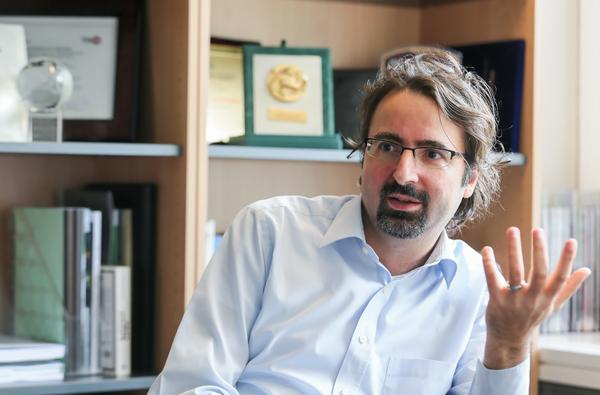The New "Food Center" Calls for Projects

© 2014 EPFL
Today EPFL is inaugurating an interdisciplinary research center focused on nutrition and foods. The new Integrative Food and Nutrition Center (CNU) aims to bring together the big players in research and industry around issues related to food.
Producing and distributing quality food worldwide is one of the major challenges facing the international community in the coming years. In order to contribute to the search for innovative solutions in this domain, EPFL is launching a new interdisciplinary center called the Integrative Food and Nutrition Center (CNU).
The center aims to act as an interface between EPFL researchers and industry to promote the development of transdisciplinary projects at all levels of the food value chain. A call for projects is issued to scientists across all Schools.
Francesco Stellacci, Director of the new research center:
Why is it important to address the issue of food?
Feeding the world's population is the next great challenge for the 21st century. Each year more than one billion ton s of food is lost or wasted in the world, while hundreds of millions of people are undernourished. Moreover, with population growth, current modes of food production will soon no longer be able to support the global population. Food quality is also at the heart of issues related to health. Economic, political as well as technological factors all come into play. Scientists have a moral and social duty to address this issue.
s of food is lost or wasted in the world, while hundreds of millions of people are undernourished. Moreover, with population growth, current modes of food production will soon no longer be able to support the global population. Food quality is also at the heart of issues related to health. Economic, political as well as technological factors all come into play. Scientists have a moral and social duty to address this issue.
What is the mission of the new Integrative Food and Nutrition Center?
The CNU aims to bring together experts from all disciplines around the topic of food and nutrition and help them to find institutional funding for their projects or to launch start-ups. In conjunction, it will establish a link between researchers and industry, fostering the transfer of technologies.
The center is built around several axes. These are: improving the means of production, reducing waste and developing new foods capable, for example, of treating certain diseases.
What are the criteria for proposing a project to CNU?
One of the principal investigators must come from EPFL. Otherwise, the center is open to all specialists. As with the Center for Energy Research, the CNU requires multiple competencies to carry out their projects. The creation of smart packaging or manufacturing new kinds of food requires multidisciplinary expertise, involving engineering as well as chemistry, biology and computer science.
Why establish this center in Switzerland?
Food and health occupy a very important place in Switzerland. Food production accounts for nearly 5% of the GDP, which is the equivalent of the watch industry. The country is home not only to the company Nestlé but also to nearly 2,000 small and medium-sized enterprises operating in this field. Together with the academics invited to participate in this development venture, we could transform French-speaking Switzerland into "Food Valley".
Internet website and program: http://nutritioncenter.epfl.ch/
-----
Figures:
- 1.3 billion tons of food lost or wasted annually in the world
- direct economic consequences: 750 billions dollars losses
- 54 per cent of the world's food wastage occurs "upstream" during production, post-harvest handling and storage. Forty-six percent of it happens "downstream," at the processing, distribution and consumption stages.
- About 870 million people go hungry every day
- By 2050 the world's population will reach 9.1 billions. In order to feed this population, food production must increase by 70 percent.
Source: Food and Agriculture Organization of the United Nations 2013 report
-----
